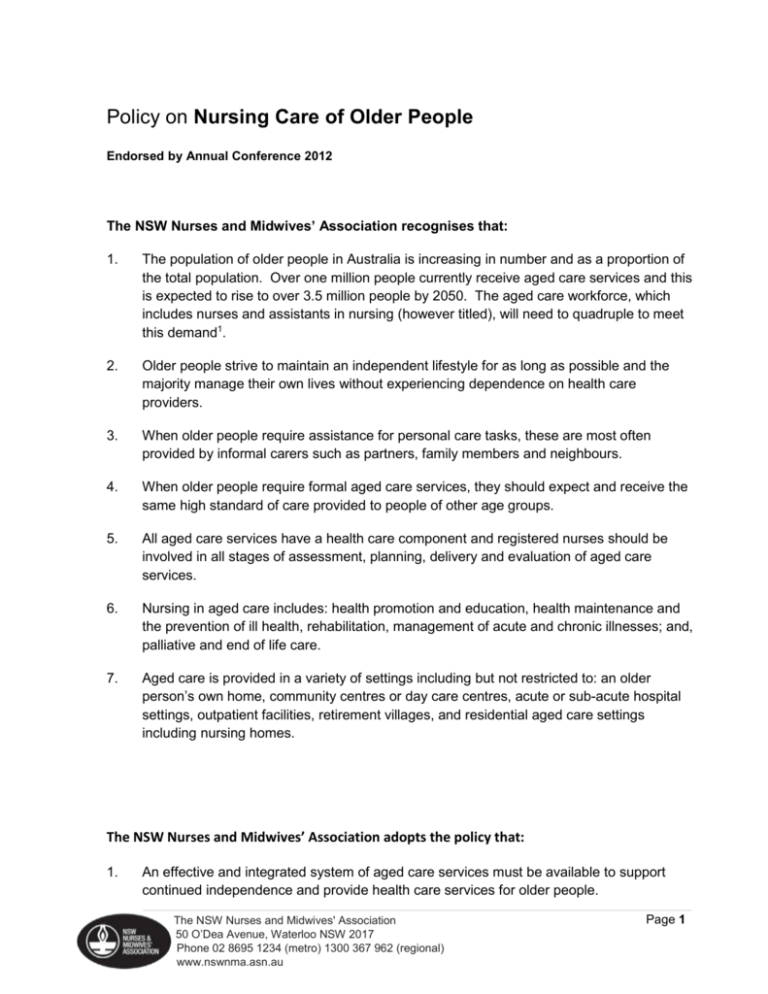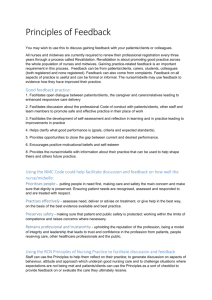Policy on Nursing Care of Older People
advertisement

Policy on Nursing Care of Older People Endorsed by Annual Conference 2012 The NSW Nurses and Midwives’ Association recognises that: 1. The population of older people in Australia is increasing in number and as a proportion of the total population. Over one million people currently receive aged care services and this is expected to rise to over 3.5 million people by 2050. The aged care workforce, which includes nurses and assistants in nursing (however titled), will need to quadruple to meet this demand1. 2. Older people strive to maintain an independent lifestyle for as long as possible and the majority manage their own lives without experiencing dependence on health care providers. 3. When older people require assistance for personal care tasks, these are most often provided by informal carers such as partners, family members and neighbours. 4. When older people require formal aged care services, they should expect and receive the same high standard of care provided to people of other age groups. 5. All aged care services have a health care component and registered nurses should be involved in all stages of assessment, planning, delivery and evaluation of aged care services. 6. Nursing in aged care includes: health promotion and education, health maintenance and the prevention of ill health, rehabilitation, management of acute and chronic illnesses; and, palliative and end of life care. 7. Aged care is provided in a variety of settings including but not restricted to: an older person’s own home, community centres or day care centres, acute or sub-acute hospital settings, outpatient facilities, retirement villages, and residential aged care settings including nursing homes. The NSW Nurses and Midwives’ Association adopts the policy that: 1. An effective and integrated system of aged care services must be available to support continued independence and provide health care services for older people. The NSW Nurses and Midwives' Association 50 O’Dea Avenue, Waterloo NSW 2017 Phone 02 8695 1234 (metro) 1300 367 962 (regional) www.nswnma.asn.au Page 1 2. Nursing care is an integral component of aged care and is provided by the nursing team, comprised of registered nurses, enrolled nurses and assistants in nursing (however titled). 3. Nursing care must be coordinated by registered nurses, and provided by adequate numbers of registered nurses, enrolled nurses and assistants in nursing (however titled) with the appropriate skills, qualifications and experience to ensure holistic care needs are met. 4. Aged care nursing is a post-registration specialty and registered nurses should have gerontic nursing qualifications wherever possible, and demonstrated knowledge and skills in aged care. 5. Enrolled nurses should have additional training and education in aged care, demonstrated knowledge and skills in aged care, and work under the supervision of a registered nurse. 6. Assistants in nursing (however titled) should have Certificate III qualifications from an ASQA-Accredited2 Registered Training Organisation as a minimum, demonstrated knowledge and skills in aged care, and work under the supervision of a registered nurse. 7. Specialist nursing skills are required in the care of older people and it should be recognised that many older people may have concurrent illnesses, disabilities and health conditions, (such as acute or chronic illness, mental illness or disorder, disabilities, drug and alcohol dependencies, or challenging behaviours) and registered nurses with a range of specialist qualifications and skills should be incorporated into the care model.3 8. Models of nursing care should promote the development of partnerships and collaborative practice within the health system including across the public and private sectors, and between community based, hospital and residential settings. 9. Professional lines of accountability to nursing must be maintained for registered and enrolled nurses regardless of the setting in which they function. 10. Registered and enrolled nurses should be supported to provide and receive formal clinical supervision as part of maintaining professional practice and continuing professional development. 11. Registered and enrolled nurses and assistants in nursing (however titled) should have access to continuing education appropriate to their area of aged care nursing. 12. Registered nurses should have access to career paths which include clinical, administrative, managerial, educative and research streams in the public and private sector. 13. Registered and enrolled nurses, student nurses on placement and assistants in nursing (however titled) must work within the legal, policy and professional requirements according to their role and the jurisdiction in which they work. The NSW Nurses and Midwives' Association 50 O’Dea Avenue, Waterloo NSW 2017 Phone 02 8695 1234 (metro) 1300 367 962 (regional) www.nswnma.asn.au Page 2 14. Handover between nurses on change of shifts, and the maintenance of documentation, are integral to nursing care. 15. All nursing care for older people must promote optimal levels of independence while taking into account the person’s functional abilities and limitations to ensure safety and comfort is maintained. 16. Physical environments should be user friendly, adjusted to the person’s individual needs, level of independence and safety, be aesthetically pleasing and aim to promote comfort. 17. Appropriate aides and modifications should be available to promote independence and ensure nursing care can be delivered safely, and comfortably, while maintaining privacy. 18. Nursing care should support a person-centred approach, be consistent with the Charter of Resident’s Rights and Responsibilities4, and any incorporate recognised Advance Care Planning documentation of the older person. 19. Nursing care should consider and include the person responsible for the older person, as well as partners, relatives, friends and carers that the older person requests be involved in their care. Notes: 1. Page XXII Caring for Older Australians, Productivity Commission Inquiry Report, Volume 1, No. 53, 28 June 2011 2. ASQA is the Australian Skills Quality Authority, the national regulator for Australia’s vocational education and training sector 3. Including Nurse Practitioners, Clinical Nurse Consultants, Nurse Educators and Clinical Nurse Specialists. 4. Charter of Residents Rights and Responsibilities, Department of Health and Ageing The NSW Nurses and Midwives' Association 50 O’Dea Avenue, Waterloo NSW 2017 Phone 02 8695 1234 (metro) 1300 367 962 (regional) www.nswnma.asn.au Page 3





